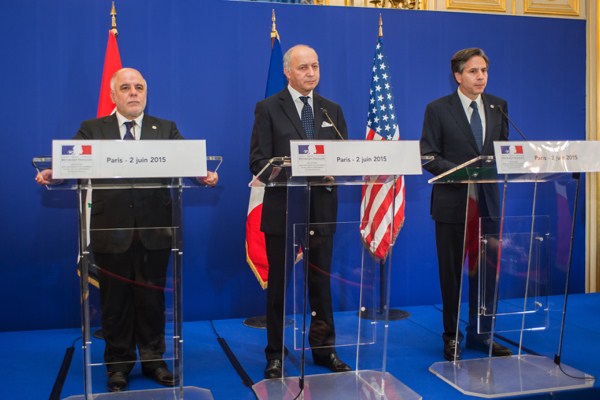Officials from 20 countries participating in the U.S.-led coalition against the so-called Islamic State (IS) met in Paris today to discuss their strategy against the insurgent group. U.S. Deputy Secretary of State Antony Blinken said that air strikes and support to Iraqi forces are the right course of action against IS, though Iraqi Prime Minister Haider al-Abadi called IS’ advance in his country a “failure” of the international community.
Abadi has faced criticism since assuming office last September that he has not done enough to facilitate Sunni-Shiite reconciliation in Iraq. Iraq’s Sunnis find themselves in a difficult situation—“ground zero in the struggle” against IS, as Myriam Benraad put it for World Politics Review in March. “Any defeat of IS,” she added, “which arose and has been fed principally by the failure of political powers to grasp the scale of the problem in time, must include a political component addressing Sunni grievances in Iraq if it is to be sustainable.” That wouldn’t be easy:
Iraqi Kurds are also facing difficult choices in the face of IS’ rise, which has put a long-fought drive for Kurdish independence on hold. Iraqi Kurdish peshmerga forces have been on the front lines of the fight against IS. But according to Hannes Cerny, writing for WPR last September, “the chances of a unilateral pursuit of Kurdish independence have once again receded, precisely because Iraqi Kurds have been prominently integrated into the international coalition to defeat the Islamic State.” Moreover, following a tough defeat to IS in northern Iraq last summer:
The failure of the peshmerga, expected to defend Kurdish independence, rattled Kurdish self-confidence and made it painfully obvious that in the hostile environment of today’s Middle East, a Kurdish state could not survive on its own. It also highlighted the fact that for all their talk of independence, Iraq’s Kurds remain dependent on Western goodwill and support.
Keep reading for free!
Get instant access to the rest of this article by submitting your email address below. You'll also get access to three articles of your choice each month and our free newsletter:
Or, Subscribe now to get full access.
Already a subscriber? Log in here .
What you’ll get with an All-Access subscription to World Politics Review:
A WPR subscription is like no other resource — it’s like having a personal curator and expert analyst of global affairs news. Subscribe now, and you’ll get:
- Immediate and instant access to the full searchable library of tens of thousands of articles.
- Daily articles with original analysis, written by leading topic experts, delivered to you every weekday.
- Regular in-depth articles with deep dives into important issues and countries.
- The Daily Review email, with our take on the day’s most important news, the latest WPR analysis, what’s on our radar, and more.
- The Weekly Review email, with quick summaries of the week’s most important coverage, and what’s to come.
- Completely ad-free reading.
And all of this is available to you when you subscribe today.

